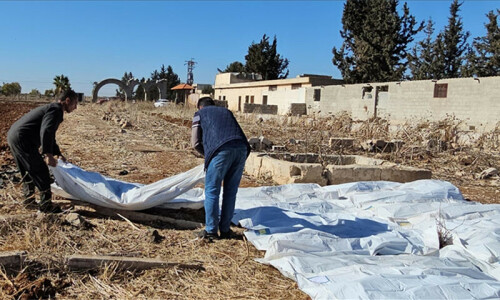
Watching pressers from the UN’s Swiss offices, we agreed that Geneva II is a waste of time. There’s no hope no matter how optimistic we pretend to be these days.
Um Nour, a 47-year-old mother of three, chose to show me pictures and videos of her happy days in her Syrian hometown. She greatly misses her Bungalow-style home, and asked me how I found it in the picture. I smiled and assured her that the house was beautiful. She paused to cry and involuntarily I joined her as well. We scanned through more photos in sheer nostalgia.
The photos showed her dancing and enjoying herself with her lovely family. But that was a couple of years ago. Fearing death and starvation, they had no option but to migrate somewhere safe.
This snowy evening of Istanbul, nothing interrupted us except a news update from Geneva. “Geneva II deadlocked over Assad’s future”. Then, appeared a hapless Lakhdar Brahimi, warning us “not to expect any miracles”. We both exclaimed simultaneously, ‘Shukran’ (Thank you!)
It’s not the first time that the UN and the world powers have disappointed us. Looking at Um Nour, I recalled the regime's response on the first day of the talks. When asked to free women and children in the historic city of Homs, the reply was: “They are spies for terrorist groups.”
I asked myself, how anybody could describe women from Homs as sweet as Um Nour, as terrorists. But no wonder, it is the same regime under which over 100,000 citizens have been killed, most of whom were women and children. Half of Syria’s population is homeless today, with two million taking refuge outside the country.
The Ba’athist regime has perfected all tricks in punishing the people, from torture to Sarin gas attacks, and abduction to rape. Victim of his chemical weapons are not even mentioned in passing ever since Russia cleverly made Assad denounce the capability and its use in future. He has long surpassed Israel by not sparing the Palestinian refugees in the Yaromuk camp.
The second day of the talks did not appear any more hopeful than the first. When the opposition asked for the release of detainees, the response came that they needed to check with Damascus before giving any word on that, proving they were mere dummies at the hands of Assad.
Last week, the Syrians seemed optimistic regarding the talks. My family and friends were dreaming about returning home and resuming their lives. Others miss the country it used to be with security and safety.
My non-Syrian friends on the other hand, hardly understand our optimism with these talks, especially the possibility of sitting around the same table with the Assad regime and its key backer, Iran. One of them questioned as to how we can forget whatever Assad did to the Syrians and share the table with him.
Here are the reasons why Syrians inside and outside their homeland, despite little hope are optimistic about the Geneva talks:
Firstly, everybody agrees that going to Geneva II will weaken Assad. For the first time, the game is played outside Damascus, in Geneva. The Syrian government’s presence there exposes it to questions of the world. The days of isolation are over, as now, it has to look for a political solution. The questions around Assad's fate cannot be ignored at the international forum.
Secondly, with Assad’s term ending in July, there can be some face saving for him in leaving the office and the country for good. According to his very own constitution, re-written only last year, any president can only rule for two terms. All of Assad’s chances have been exhausted. Moreover, if the violence continues, the presidential election will be only in a few areas like the coast and some cities under his control, some parts of Damascus and north of Syria where groups of Kurds supporting him control the city. Neither is a fair election possible nor will foreign observers, including the UN be able to monitor it.
Thirdly, we believe that saving lives is the top priority now, by ensuring that humanitarian aid keeps trickling in after the imposition of a ceasefire. We know that once the regime stops the killings, Syria's streets will be filled again with peaceful protests.
Fourthly, by sitting on the Geneva II table, the regime admitted the legitimacy of an exiled opposition. Assad’s representatives cannot be the only ones representing Syria.
It’s good that the UN withdrew its invitation for Iran. Without the recognition of Geneva I, Tehran should not have been granted a seat at the latest talks, only because it is said to have links with Hezbollah. With its attendance, the chances of success at Geneva II could have been far remote.
The Syrians already know that the process will take time before anything real happens on ground. However, they fear a shift in US policy towards Assad in reward for forgoing chemical weapons and fighting against al Qaeda. Russia and Iran won’t quit Syria easily to its suffering citizens.
However, the fact-on-ground is that Geneva II is going nowhere. As the regime refuses to talk about Assad's fate, the talks have become meaningless. But I can’t put it better than the Syrian opposition which described the talks as ‘dialogue with the deaf’.
Syrians realise that neither did a leader start the revolt nor can he control it. It was the people of Syria, and it is only they who will decide the future course at the end.
To me, the Dayton Accord offers some ray of light as a model. The agreement ended a horrendous and bloody war in the Balkans. There the world had gathered some political will. Here the global leaders have gone simply bankrupt.











































